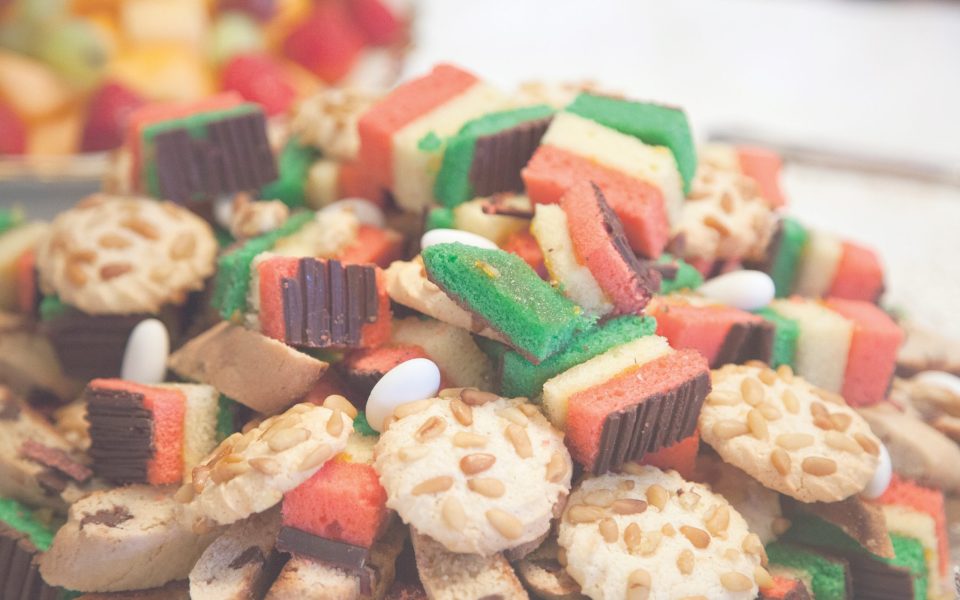We haven’t done the seven fishes since I was a very little kid.
Like pizza, spaghetti with meatballs and sweeping the sidewalk, the Feast of the Seven Fishes is one of those traditions with roots in the old country but is primarily an Italian-American invention.
Mine was just the third generation born on US soil on my maternal grandfather’s side, the fourth on my grandmother’s — marrying a non-Italian would have been considered a mixed marriage in the 1940s when they wed. My grandmother and my noni, what Italians call their great-grandmothers, kept the vigil when I was small: an array of shrimp marinara with linguine and spicy red sauce; baccalá, or salted codfish with onions and crushed red pepper; eel; clams; fried smelt; scungili; maybe a puttanesca, I don’t know. Like I said, I was small.
The tradition comes from an obscure practice in fishing villages on the southern end of the boot: Technically, it’s a fast, because in Roman Catholic culture, fish is sort of a vegetable, partaken around midnight to coincide with the birth of the baby Jesus.
The breadth of the feast diminished as the years wore on. My mother’s brother and sister, my aunt and uncle, both have strong aversions to fish. And as their growing families pulled them away from the Christmas Eve festivities at my grandma’s house, she scaled the meal down to the shrimp the biggest my grandfather could find the baccalá, which nobody but my mother would eat, and occasionally the smelt.
There’d be a giant antipasto, though, with roasted peppers, salamis and cheeses from my grandfather’s preferred purveyors of Italian goods, coarse salads of cece and eggplant and artichoke and whole cloves of marinated garlic. A round loaf of bread as big as a manhole cover, with a dense crust and billowy insides, stayed on the table.
Afterwards we’d go up Mount Kemble for midnight mass at the Villa Walsh, an invite-only affair hosted by this small sect of Italian nuns. My grandfather was their dentist, earning him a favored spot in the very first pew.
The grateful nuns sent a tray of homemade Italian Christmas cookies every year: scarpe di cavallo, pizzelles, taralles, pignolli cookies and crispelli di natale, mincemeat-stuffed pies that always went quickly. At the center of the tray was always this brown, amorphous, fruitcake-type thing that looked like chocolate but wasn’t. Without fail it was the last thing on the tray to be eaten every year, and no one in the family, or any Italian American I’ve ever asked, knows has ever heard of this dish. We called it “the turd.”
My Aunt Louise — who spent so much time in the kitchen that when I was little I thought she was my Aunt Flora’s maid — was the keeper of my favorite Italian Christmas cookie: pizelles, a batter-based, deep-fried delicacy made by dipping an iron into a thin batter and then dropping it into the bubbling fryer. She sent a giant tin every year to my grandma’s house, in a container that used to hold Charles’ Chips.
If my grandfather had been into Manhattan, we’d have hard torrone candy, the kind you need to break with a hammer. If he had not, we’d have the soft torrone, imported from Italy, wrapped in foil and packaged in little tiny boxes. And sometimes there would be a struffoli — little balls of fried dough mortared together with honey and sprinkles.
I was into my teens before I realized that most Americans basically run a repeat of Thanksgiving for the Christmas Day meal: turkey and whatnot. Italian-Americans do it differently. Even on Thanksgiving, my grandmother would make ziti. And on Christmas we do another massive antipasto before a main course of lasagne, meatballs, sausage and braciole, again with the giant bread, the quality of which was always the subject of some discussion, from the size and weight of it to its quality in relation to last year.
The bread. The meatballs. The giant shrimp. They’re part of a sense memory so deeply entwined with the holidays and a dwindling connection to my heritage that, for me, are part of the meaning of the season.
We stopped doing the seven fishes about 10 years ago, a few years before my grandmother died. And nobody has brought up midnight mass in a good, long while. But we still get together and have lasagna on Christmas Day, with meatballs and sausages and everything else.
We’re still Italian, maybe just not as Italian as we used to be.
Join the First Amendment Society, a membership that goes directly to funding TCB‘s newsroom.
We believe that reporting can save the world.
The TCB First Amendment Society recognizes the vital role of a free, unfettered press with a bundling of local experiences designed to build community, and unique engagements with our newsroom that will help you understand, and shape, local journalism’s critical role in uplifting the people in our cities.
All revenue goes directly into the newsroom as reporters’ salaries and freelance commissions.



Leave a Reply